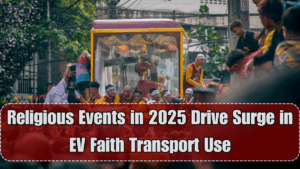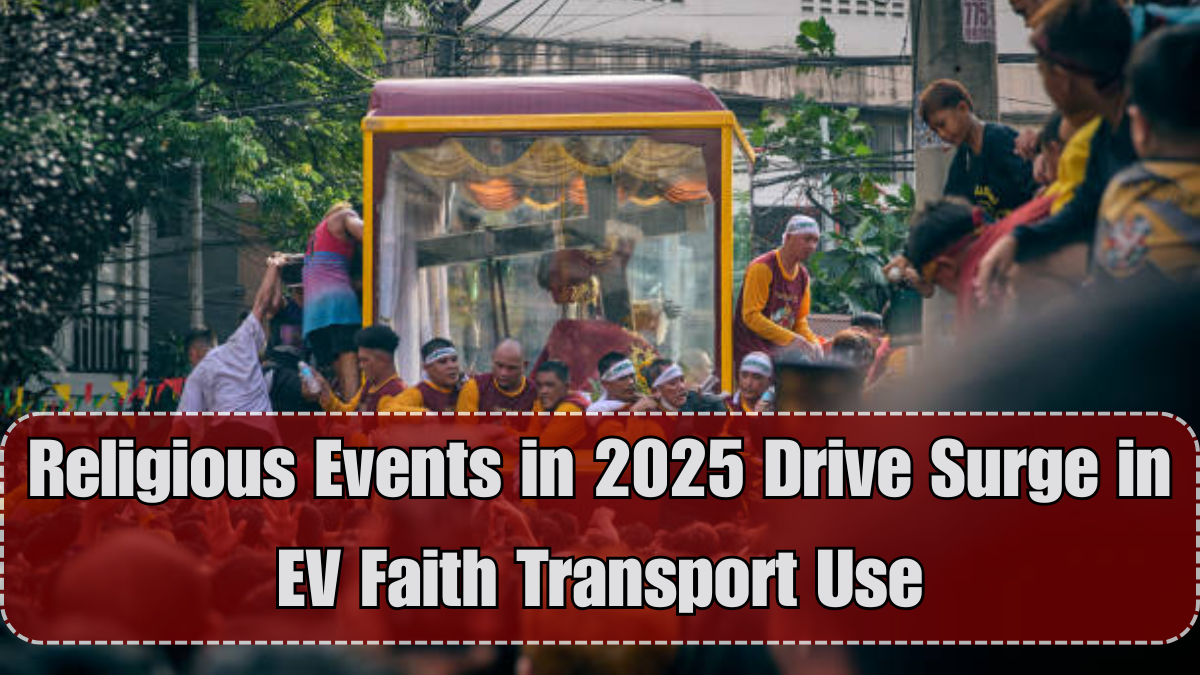India’s religious tourism sector is undergoing a massive transformation in 2025, with a significant rise in faith travel in India 2025 now powered by electric vehicles. Spiritual gatherings like Kumbh Melas, yatras, temple events, and interfaith festivals are witnessing a massive shift from traditional diesel buses to electric vans and EV buses.
This evolution is not only reducing environmental impact but also improving the overall travel experience for pilgrims. Many faith-based institutions are partnering with green vehicle providers to ensure comfortable, eco-friendly, and affordable journeys to sacred sites. The surge in faith travel in India 2025 is being powered by new state-level incentives, CSR programs, and improved EV infrastructure.
Let’s explore how this quiet revolution is shaping religious mobility this year.

What’s Driving the EV Surge in Religious Travel?
The rise in EV adoption for spiritual events is due to a mix of regulatory push, financial incentives, and environmental stewardship shown by spiritual organizations. As faith travel in India 2025 grows, the demand for non-polluting, efficient transport options is at an all-time high.
Key factors behind the EV boom:
-
Government subsidies on EV rentals for religious tourism
-
Introduction of EV-only zones around major pilgrimage areas
-
Faith institutions purchasing their own EV fleets
-
Public-private partnerships offering discounted EV buses for yatras
-
Improved charging stations at religious locations
Pilgrims now experience smoother, quieter rides with lower carbon footprints — matching the spiritual values of purity and harmony.
How Religious Institutions Are Responding
Temples, churches, mosques, and gurdwaras are actively transitioning their transport services to electric models. The emphasis is on reducing pollution during large-scale gatherings while making transport more cost-effective and reliable.
Common steps taken:
-
Replacing diesel vans with e-vans for local pick-ups and drop-offs
-
Partnering with government EV fleet operators
-
Training volunteers to operate and maintain EVs
-
Setting up solar-powered charging stations at faith campuses
-
Receiving faith-mobility grants under state eco-initiatives
This rapid change highlights how faith travel in India 2025 is becoming a model for sustainable mobility nationwide.
Table: Diesel Travel vs EV Travel for Faith Events
| Aspect | Traditional Diesel Travel | EV-Based Faith Travel 2025 |
|---|---|---|
| Fuel Cost | ₹90–₹95 per litre | ₹1.5–₹2 per km |
| Pollution Level | High | Zero tailpipe emissions |
| Noise | Loud engines | Quiet and smooth operation |
| Vehicle Comfort | Basic | Air-conditioned, modern EVs |
| Maintenance Cost | High | Lower and predictable |
| Subsidies Available | No | Yes, under faith mobility programs |
By choosing electric vehicles, religious groups not only save money but also contribute to clean air and climate action — making faith travel in India 2025 spiritually and socially responsible.
Impact on Pilgrims and Local Communities
Pilgrims now enjoy a cleaner, safer, and more reliable form of transport. Moreover, local communities benefit from reduced road noise and better air quality during high-volume events. The switch also generates green jobs for drivers, mechanics, and energy managers.
Benefits include:
-
Reduced health risks from pollution
-
Easier compliance with travel permits near eco-sensitive zones
-
Community goodwill through visible environmental commitment
-
Lower travel expenses for large groups
The wide adoption of EVs in faith travel in India 2025 reflects a larger national goal — aligning spirituality with sustainability.
FAQs
What is faith travel in India 2025?
It refers to the increasing use of electric vehicles for transportation to and from religious events, pilgrimages, and spiritual gatherings across India.
Why are EVs used for religious events?
They’re cleaner, quieter, more affordable, and now supported by various government schemes and NGO partnerships for faith-based organizations.
Who provides EV transport during pilgrimages?
Both government and private EV fleet operators, often working in coordination with temples, churches, mosques, and gurdwaras.
Are charging stations available near religious places?
Yes. In 2025, many pilgrimage centers have installed EV charging hubs, some even powered by solar energy, to support green travel.
Can small faith groups rent EVs for local events?
Absolutely. Many EV rental services now offer low-cost or subsidized EV vans for short-distance religious travel under faith mobility initiatives.
Click here to know more.
